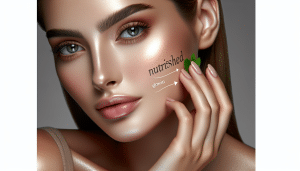Surprising Secrets Behind Glowing Skin Revealed
Ella Knight October 14, 2025
Discover unique, research-backed tips for achieving luminous, healthy skin using methods you may not expect. This guide delves into trending skincare routines, natural ingredients, hydration hacks, and the science behind inner and outer wellness for lasting beauty.
Unlocking the Science of Radiant Skin
Ever wondered why some people catch compliments on their skin every day? Healthy skin isn’t just about applying a few creams at bedtime. In reality, the journey to luminous, glowing skin begins with understanding the skin barrier and how it retains moisture and nutrients. A robust barrier helps shield against pollution, UV rays, and daily stressors that can speed up aging. The interplay between the outermost skin layer and environmental factors shapes overall skin tone and resilience. Skincare products enriched with ceramides, niacinamide, and gentle exfoliants give the skin barrier the support it needs while minimizing irritation from harsh elements.
Hydration is a secret weapon. But it extends beyond drinking eight glasses of water a day. Topical hyaluronic acid, squalane oils, and glycerin serums can lock in much-needed moisture, preventing flakiness and dullness. Nighttime rituals involving hydrating masks or sleeping packs can help. Many dermatologists recommend patch testing these popular treatments before fully integrating them into a regimen, especially for sensitive skin types or those prone to redness.
Sun protection sits at the core of every healthy skincare routine. Dermatologic studies suggest that sunscreen with broad-spectrum SPF 30 or higher should be a daily staple, even indoors or during cloudy weather. UV rays trigger premature aging, pigmentation, and loss of elasticity. Reapplying sunscreen every two hours enhances protection against these factors. For extra defense, some people layer antioxidant-rich serums, such as vitamin C or green tea extracts, under their sunscreen to neutralize free radicals and promote radiant skin.
Natural Ingredients That Support Healthy Skin
Nature’s beauty arsenal offers a wealth of ingredients that enrich skincare routines in surprising ways. Niacinamide, found in foods such as mushrooms and grains, helps to brighten the complexion and even out tone when applied topically. Aloe vera has cooling, anti-inflammatory properties that can quickly calm irritation or redness. Research suggests that green tea extracts deliver powerful antioxidants, supporting skin elasticity and reducing signs of aging caused by environmental stressors.
Certain oils, like jojoba and rosehip, mimic the skin’s natural sebum and can balance oily or acne-prone skin. They are often praised for their nourishing omega fatty acids and skin-renewing vitamin E. Incorporating these oils into facial massages may boost circulation, lift dullness, and create a dewy, healthy glow, providing instant satisfaction to even the most tired complexions.
Seasonal fruits and superfoods, such as berries and pumpkin, can be whipped into DIY face masks rich in vitamins and enzymes. While these homemade treatments should be introduced cautiously, they can exfoliate gently and leave skin looking refreshed and energized. Nutritionists remind us that eating a diet filled with colorful produce supports both internal wellness and external glow, showcasing the deep link between skin, diet, and overall health.
The Hydration and Diet Connection
Beautiful skin begins from within. Maintaining the right level of hydration in your body directly impacts your skin’s suppleness and moisture barrier. Drinking water, herbal teas, and infusing daily routines with water-rich foods like cucumbers and melons give the complexion a natural plumpness. Research consistently shows that people who meet their daily hydration needs are less likely to experience dryness, irritation, or breakouts connected with dehydration.
A diet packed with vitamins, antioxidants, and healthy fats is just as critical. Omega-3 rich foods like walnuts and flaxseed oil protect against inflammation and may help soothe troubled skin. Limiting added sugars and highly processed foods reduces the likelihood of uneven texture and blemishes. Instead, a focus on leafy greens, sweet potatoes, avocado, and salmon supports skin health, providing building blocks for collagen and elastin production.
Supplements such as vitamin D, zinc, and probiotics have gained attention for their role in maintaining balanced skin. Some people with sensitive or problematic skin notice significant changes after targeting nutrient deficiencies. Consulting with a healthcare professional before adding supplements is recommended, as individual needs and responses may vary widely. These internal supports, when combined with an effective topical regimen, lay the groundwork for clear and comfortable skin.
Modern Skincare Routines: Trends and Evidence
Skincare routines have shifted in recent years. Instead of harsh stripping and over-cleansing, “skinimalism” has emerged as a gentle, layered approach using fewer but more potent products. For many, this means focusing on the essentials: a mild cleanser, targeted serum, moisturizer, and UV protection. Layering actives, such as retinol or peptides, requires care to avoid irritation. Research highlights that simplicity often leads to better long-term skin health, compared to complex routines that risk ingredient conflicts.
Facial massage tools like jade rollers and gua sha stones are popular for a reason. They support lymphatic drainage and can reduce visible puffiness after sleep or dehydration. These tools, combined with lightweight oils, encourage relaxation and may leave skin looking noticeably calmer and more defined. Still, consistency is key—quick daily rituals often outperform occasional intense treatments, according to skincare experts and recent beauty trends observed on social channels.
Technology is taking center stage in beauty routines, with LED masks and microcurrent devices available for home use. Emerging research suggests benefits for skin texture and brightness, but results depend on regular safe use. It’s wise to start slowly and monitor skin response. Many dermatologists recommend supplementing—not replacing—core steps like cleansing, hydrating, and sun protection with these modern at-home treatments for the best results.
Lifestyle Factors Affecting Your Skin’s Natural Glow
Beyond skincare products, several daily habits can dramatically shift how skin looks and feels. Getting consistent, adequate sleep allows the skin to recover and repair overnight, preventing dullness and dark circles. Chronic stress, meanwhile, increases levels of cortisol, which can trigger breakouts or accelerate visible aging. Practicing mindfulness, setting regular sleep schedules, and prioritizing rest all contribute to long-lasting glow from within.
Exercise isn’t just for fitness. Physical activity promotes healthy circulation, which brings oxygen and nutrients to skin cells while removing waste and toxins. Many people notice a post-exercise radiance that lasts well beyond the workout itself. Gentle activities like yoga and pilates also encourage flexibility in facial muscles, preserving youthful contours and elasticity. Overexercising or exposure to excessive heat, however, can sometimes irritate the skin or exacerbate conditions like rosacea, so moderation is advised.
Environmental exposure, including city pollution and blue light from electronic screens, can put stress on the skin. Using products with antioxidants and installing smart indoor air purifiers might help mitigate these effects. Creating a balanced indoor environment—via humidity control and minimizing harsh artificial lighting—also preserves moisture levels and gives the skin the ideal conditions for recovery and radiance.
Personalized Skincare and Finding the Right Routine
No two complexions are alike, and customized skincare is gaining ground. Patch testing new products, rotating actives based on the season, and tracking responses to dietary changes are smart tactics for revealing what works. Digital consultations with certified dermatologists can provide guidance tailored to individual needs. Understanding underlying conditions, such as eczema or hormonal imbalances, leads to more effective choices without unnecessary trial and error.
Listening to your skin’s signals helps refine routines. Signs like irritation, persistent dryness, or sudden breakouts may suggest overuse of actives or incompatible products. Adopting a simple, gentle approach and gradually introducing new products ensures the skin has time to adjust and build resilience. Journaling changes and responses over time helps identify patterns and streamline decision-making, resulting in a calm, balanced appearance.
Wellness experts note the importance of self-compassion during the skincare journey. Results rarely appear overnight, and high-performance products can take weeks to show effects. Avoiding comparison to social media or rigid beauty standards allows people to appreciate personal progress. With patience, research-backed choices, and healthy lifestyle habits, it’s possible to achieve a naturally glowing complexion that reflects individual vitality and care.
References
1. American Academy of Dermatology Association. (n.d.). How to maintain healthy skin. Retrieved from https://www.aad.org/public/everyday-care/skin-care-basics/care/maintain-healthy-skin
2. Mayo Clinic. (n.d.). Skin care: 5 tips for healthy skin. Retrieved from https://www.mayoclinic.org/healthy-lifestyle/adult-health/in-depth/skin-care/art-20048237
3. Harvard T.H. Chan School of Public Health. (n.d.). The nutrition source: Skin health. Retrieved from https://www.hsph.harvard.edu/nutritionsource/skin-health/
4. Cleveland Clinic. (n.d.). Sunscreen: Why you need to protect your skin. Retrieved from https://health.clevelandclinic.org/why-you-need-to-protect-your-skin-with-sunscreen/
5. National Center for Complementary and Integrative Health. (n.d.). Herbs at a glance: Aloe vera. Retrieved from https://www.nccih.nih.gov/health/aloe-vera
6. Sleep Foundation. (n.d.). How sleep affects your skin. Retrieved from https://www.sleepfoundation.org/physical-health/how-sleep-affects-your-skin







